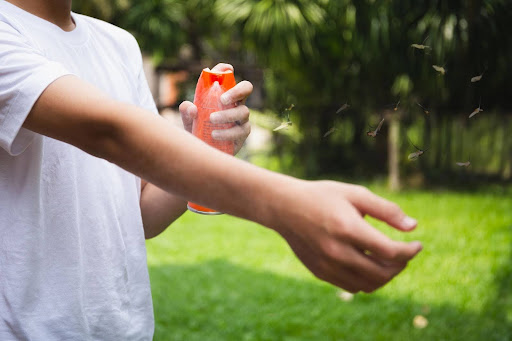Mosquitoes are more than just an annoyance buzzing around your yard. For homeowners in Washington, these tiny pests pose a seasonal challenge that can disrupt outdoor fun and even introduce health concerns.
Washington is home to several species of mosquitoes, known for their itchy bites and potential to carry diseases.
Washington mosquitoes are known for their persistence during the warmer months, making backyards and homes prime targets. But with a few proactive measures and our expert help, you can enjoy your outdoor spaces without the irritation of mosquito bites.
At Natura Pest Control, we’re here to help you tackle mosquito infestations head-on so you can spend less time swatting and more time relaxing.
What’s the Deal with Washington Mosquitoes?
If you’ve felt like mosquitoes invade the outdoors every summer, you’re not imagining things.
Washington’s climate makes it a favorable spot for mosquito breeding, with warm temperatures, plenty of standing water, and high humidity creating the perfect conditions for these pesky bugs. Mosquitoes thrive from spring through late fall, hatching in waves as the seasons progress.
The most common mosquito species in Washington include the Culex and Aedes varieties. Culex mosquitoes are most active from dusk till dawn, while Aedes mosquitoes—the ones responsible for those irritating daytime swarms—love the full light of day.
Beyond their itchy bites, mosquitoes can transmit diseases, including the West Nile virus, which saw periodic cases in Washington over the last several years. While the overall risk is low, it’s not worth taking chances. Stopping Washington mosquitoes at their source is the best way to avoid bites and protect both your family and your pets.
The Mosquito Life Cycle 101
Understanding how mosquitoes multiply is key to managing their population.
Female mosquitoes lay their eggs in standing water or on damp surfaces that can later flood. This water doesn’t have to be a big pond or lake—it can be the tiniest puddle in your yard, an upturned flower pot, or even water pooling in clogged gutters.
The eggs hatch within days into larvae, then transition to pupae and ultimately emerge as adult mosquitoes. The whole process can take as little as 10 days, meaning populations grow fast if left unchecked.
If you’re noticing more mosquitoes in your yard lately, chances are, there’s hidden standing water nearby. Taking their breeding habits seriously can make all the difference in preventing an infestation.
Why Washington’s Mosquito Season Feels Endless
The length of mosquito season in Washington depends largely on the weather. Late spring rain often leads to standing water, giving mosquitoes their breeding grounds.
Once the summer heat hits, mosquito activity quickly ramps up, with these pests making a grand appearance in backyards, parks, and neighborhoods statewide.
Since mosquitoes rely on warm weather to stay active, the season stretches well into September or sometimes even October during particularly warm years.
Without immediate interventions, their presence can make enjoying patio dinners, BBQs, or evening bonfires a mosquito-filled nightmare.
Protecting Your Home and Yard from Mosquitoes
Tired of spending summer evenings managing mosquito bites instead of enjoying your patio? It’s time to take control.
Here are some ways you can manage and reduce the mosquito population in your yard:
1. Eliminate Standing Water
One of the simplest, most effective steps you can take is to remove all sources of standing water. Empty bird baths, kiddie pools, and buckets regularly, and make sure your gutters are clean. Even small amounts of stagnant water are enough for mosquitoes to breed.
2. Trim Back Vegetation
Mosquitoes love hiding in tall grass, dense shrubs, and overgrown plants. Keeping your lawn mowed and trimming overgrown vegetation will reduce their hiding spots and encourage them to move it along.
3. Use Mosquito-Repelling Plants
Certain plants, like citronella, lavender, and marigolds, are known for their mosquito-repellent properties. Incorporating these plants into your landscaping can help reduce the mosquito population naturally while adding a nice touch to your yard.
4. Install Screens or Barriers
If you love spending time on your deck or patio, consider installing mosquito screens or investing in outdoor mosquito netting. Physical barriers are one of the best ways to enjoy the outdoors without worrying about bites.
5. Stay on Top of Repairs
Mosquitoes can enter your home through tiny cracks, broken screens, or gaps in doors and windows. Keeping your house sealed will ensure that mosquitoes stay outside where they belong.
How Natura Pest Control Can Help
When mosquitoes take over, DIY efforts can only go so far. That’s where we step in.
At Natura Pest Control, we specialize in mosquito management, treating your property to reduce mosquito breeding and activity.
Whether it’s a one-time treatment for a big event or regularly scheduled service during the height of mosquito season, we’ve got you covered.
Here’s how we can help:
- Targeted Treatments: We use effective, eco-friendly solutions to treat areas where mosquitoes breed, including under decks, along fence lines, and around shaded areas.
- Expert Advice: Our team can assess your property and recommend ways to reduce mosquito attractions, giving you a long-term defense plan.
- Accessible Services: Serving the Vancouver-Portland Metro area, we offer flexible scheduling options, so it’s easy to get the mosquito relief you need.
Don’t Share Your Yard with Mosquitoes
You don’t have to just sit back and accept mosquitoes as part of your Washington summer.
With the right strategies in place—and our team at Natura by your side—you can reclaim your outdoor spaces and focus on what really matters: enjoying quality time with family and friends.
Are you ready to stop mosquitoes in their tracks? Call us today or book your mosquito control service online to keep your yard mosquito-free this season.
Together, we’ll make sure Washington mosquitoes stay out where they belong!



